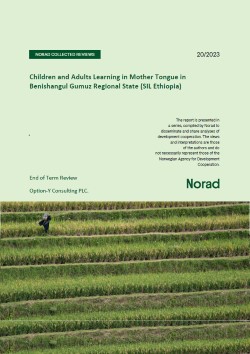Children and Adults Learning in Mother Tongue in Benishangul Gumuz Regional State (SIL Ethiopia) End of Term Review
About the publication
- Published: August 2023
- Series: Norad Collected Reviews
- Type: --
- Carried out by: Summer Institute of Linguistics (SIL) – Ethiopia
- Commissioned by: --
- Country: Etiopia
- Theme: Utdanning og forskning
- Pages: 79
- Serial number: 20/2023
- ISBN: 978-82-8369-172-6
- ISSN: 1894-518x

According to UNESCO (2016)1, mother tongue based education is vital to have cognitive, pedagogical, and social benefits, although about 40% of the global population does not have access to education in a language they speak or understand. The Agency has also stated that the best medium for teaching is the mother tongue of the pupil2. Likewise, for Dr. Susan Malone3, mother tongue-based multilingual education (MTB MLE) is highly important for learners of non-dominant language communities who do not understand or speak the language of instruction when they begin their formal education.
Research findings further showed that if young students are taught in their own or a familiar language, they are more likely to understand what they are learning and be more successful academically4. Hence, in MTB MLE programs, students begin with what they know, i.e. their language and culture, knowledge and experience, as the foundation for learning in school. Consequently, well-planned and well-implemented MTB MLE programs produce students who are multilingual and multicultural and who can contribute to the development of their community and their nation at large. In this regard, the UN Sustainable Development Goal #4 presented stated the need to “ensure inclusive and equitable quality education and promote lifelong learning opportunities for all”. And it is believed that MTB MLE is the ‘only way’ to ensure that SDG4 will be achieved in non-dominant language communities5.
However, lack of inclusive language-in-education policies in various countries is found to affect a large proportion of children in multilingual contexts and has caused limited access to education in the medium of their primary language. This has disproportionally affected the population of low-income countries and contributed to approximately 90% of those who do not receive education in their MT living in the least economically developed countries (Walter, 2014)6. Moreover, according to Dutcher (2014)7, this situation caused children in low-income countries to be incompetent in effectively engaging with the education system, which can have highly detrimental effects on the socioeconomic development of their nations. Therefore, although it is consistently overlooked in the major national development initiatives, the formulation of a rational language policy in a multilingual nation like Ethiopia should be given high priority.
